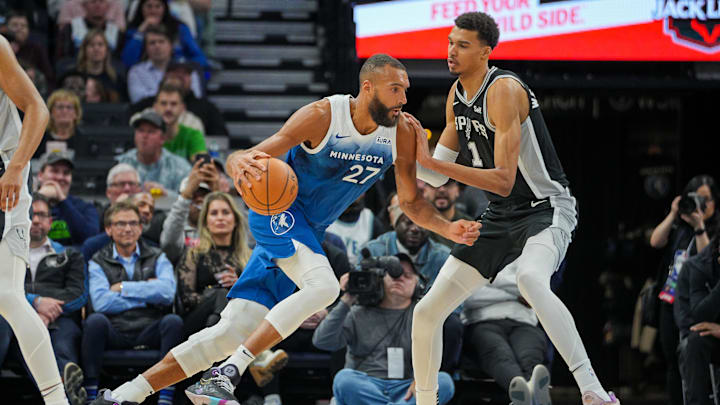Second Comparison: Defensive Impact
An often-cited statistic for Wembanyama’s DPOY case is his defensive on/off metrics. The Spurs rank dead last on defense with him off the floor and fifth when he's on, giving up 10.1 fewer points per 100 possessions.
Gobert meanwhile only elevates the Wolves' defense by 3.6 points per 100 possessions. The Timberwolves rank number one on defense even without him on the floor. However, this doesn’t tell the full story.
When making this comparison, it’s important to consider how on/off impact ratings function. On/off ratings are really a measure of how much better you are than your replacement and thus can be as much of a reflection of the incompetence of teammates as one’s dominance.
Wembanyama’s defensive on/off numbers would likely be pretty juiced if he played for my intramural team. (Yes, we would sub him off sometimes—can’t have him messing up our rotations). This is the incompetence argument taken to the extreme, but the underlying principle is true.
When the surrounding talent is weaker, the effects of individual excellence will be felt more thoroughly. Adding a 100th-percentile defender to a group of 80th-percentile defenders raises the ability of that defense less dramatically than adding a 100th-percentile defender to a group of 20th-percentile defenders. Just as people say "Wembanyama's case shouldn't be weakened by being on a bad team," Gobert's case shouldn't be weakened by being on a good one.
The on/off metrics for Gobert over the past two seasons exemplify this. Most analysts would say he is having a bounce-back season—last year’s narrative was that he was washed up. However, the raw defensive on/off numbers wouldn’t agree.
The Timberwolves gave up 5.7 fewer points per 100 possessions last year as opposed to a difference of just 3.6 this year. The difference? This year the Timberwolves have the best defense in the league even when he’s off the court, compared to 23rd with him off the court last year.
Elevating an elite defense into a historically good one is more relevant to the ultimate goal of winning an NBA championship than elevating a bad defense to an above-average one—something that should be remembered in these DPOY conversations.
How Wemby and Gobert stack up defensively in terms of on/off impact. pic.twitter.com/L4Fk89ajRW
— Jim (@WolvesAbroad) April 12, 2024
Conclusion
Wembanyama will win Defensive Player of the Year awards, probably multiple. However, this won’t be the year he starts putting the accolades on the shelf. Wembanyama himself has even acknowledged as much. When Gobert does win his fourth DPOY, the reaction could be an NBA Twitter riot—but it really shouldn’t be. The Wolves big man is leading a Timberwolves defense that is not only number one in the league but has the widest margin from league average since the Milwaukee Bucks in 2019-20.
